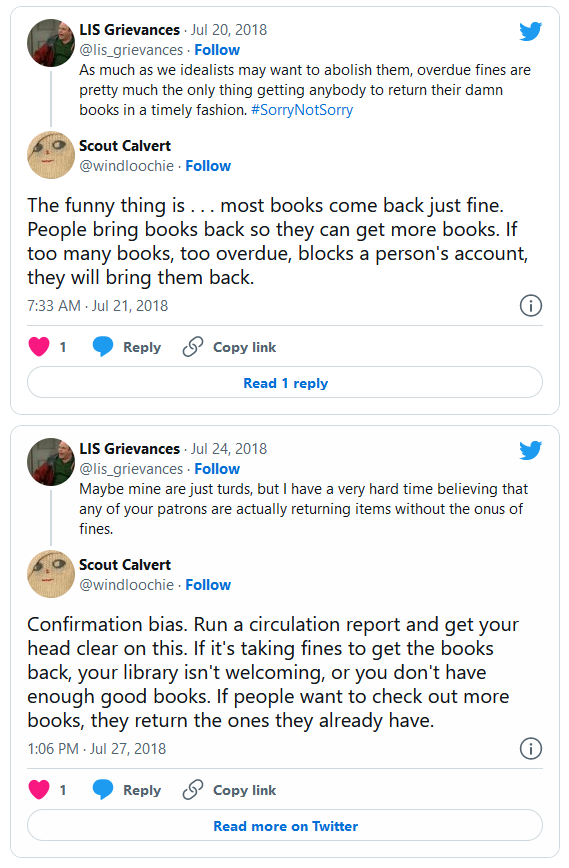Fine, Just Fine
Fines have been part of checking out library books for generations. In many cases, these fines would become significant as the items were not returned after weeks, months, or even years. In recent times though, fine-free libraries have started to become increasingly commonplace. The ALA passed a resolution in July 2019 encouraging all libraries to discontinue the practice of fining people. There was some concern about if the lack of fines would harm library budgets, but it was found that fines were about 1% of the total budget. Per David Sye at OIF (Office of Intellectual Freedom), “While Blockbuster might have hinged its finances on late fees, libraries do not. For example, in 2018, fines & fees only accounted for ~1% of revenue at the Indianapolis Public Library system (IndyPL). In fact, some libraries report that “when patrons find out their fines are forgiven, they usually donate more than we would have charged them in fines.”The quick answer is that libraries won’t take a large financial hit due to unpaid fines.” Eliminating the fines has since been implemented in hundreds of libraries with excellent results.
Why ditch the fines, though? How do the library and community benefit from this change? The primary reason is equity of access. Burbank Public Library eliminated fines for everything except damaged or lost items. When asked why, their reason was, “This move is part of our efforts to improve equity of access. While fines for overdue items may seem like a small burden, they can create a major barrier to service for those struggling financially. Too many people have chosen to stop using the Library because of the inability to pay or fear of accruing fines… Research has shown that fines are ineffective in getting materials returned on time, and libraries that have eliminated fines have found that long overdue items come back and patrons who avoided the library for years start visiting again.” Encouraging these people to re-engage with their community library benefits them as well. They now have access to services without worrying about getting fined when they can’t get to the library two weeks later. Plus, this helps libraries compete with other booksellers and e-book retailers. Libraries in Alabama, Michigan, North Carolina, and many others have stopped fining people. Their reason is, like the others, to make the library more welcoming. The Baldwin Free Library in Michigan stated, “Once someone owes a late fine, they are less likely to visit the library again, and the fear of owing late fines can cause patrons to not borrow the items they need. We hope being fine-free will encourage prior users to come back to the library, as well as encourage new users to explore our offerings.” Increasing traffic within libraries can only benefit the overall community.
Statistically speaking, “physical library visits fell from 214.6m to 59.7m in the year to March 2021,” according to the Guardian. The pandemic was a major cause of library physical usage decrease. But it will and has helped to remedy this by getting rid of fines. People who had overdue fines from years ago are no longer afraid of turning in a book they’ve had for a few years and getting the fine waived. Public libraries have many programs and services to offer their communities, but many people were wary of paying fines when their incomes were already low. Now, that’s becoming a non-issue for millions of people. They can access it without fear of financial retribution from the place whose sole responsibility is to help inform. The ALA had established that fines discriminate against lower-income individuals and do not encourage patrons to return to the library. Before the resolution was created, a Twitter conversation in 2018 illustrated the opposing mindsets of the time that two different librarians had.
It’s clear from these tweets that libraries saw a need to address the fine problem, and they worked to create a solution. Eliminating these fines was a great idea, both in practice and in principle. Communities and individuals will benefit from not owing money to their library and accessing the services and items they want most. This is what librarianship and libraries are all about.
By Gretchen Hendrick Gardella, MLIS
Gretchen Hendrick Gardella is a Librarian with administrative, research, and vast technical skills. Ms. Gardella brings over 16 years of experience working in academic and public libraries to the discussion.


